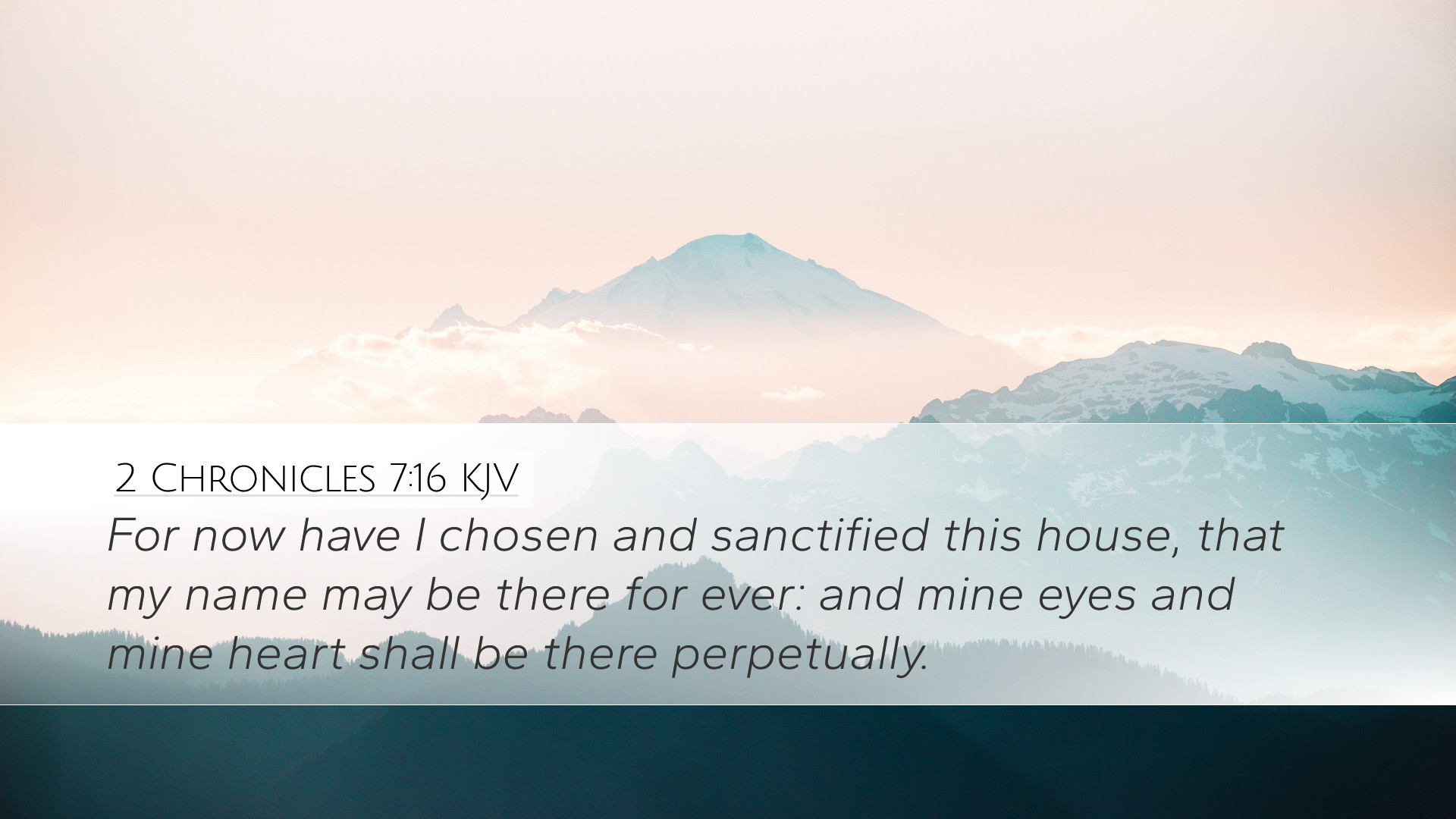Commentary on 2 Chronicles 7:16
Verse Context: 2 Chronicles 7:16 states, "For now have I chosen and sanctified this house, that my name may be there forever: and mine eyes and mine heart shall be there perpetually." This verse is situated within the broader narrative of Solomon's dedication of the temple, following his prayer and God's miraculous response with fire from heaven.
Exegesis of the Verse
This verse carries significant theological weight, reflecting God's purpose in choosing the temple as His dwelling place among His people. It indicates a unique relationship between God's presence, His chosen place, and the people of Israel. The phrase "I have chosen and sanctified this house" emphasizes the divine selection and consecration of the temple, making it a sacred space set apart for God’s glory.
Divine Selection and Sanctification
Matthew Henry highlights that God's choice of the temple signifies His commitment to the people of Israel. This is not merely a physical structure but emblematic of covenantal relationship. The sanctification indicates God's endorsement of the temple's holiness, making it a fit residence for the divine presence.
The Name of God
Albert Barnes notes that God's name represents His essence, character, and authority. It is in this temple that God’s name is to reside eternally, establishing a link between the space and divine worship. This indicates the importance of worship being properly oriented towards where God has chosen to manifest His presence.
Perpetual Presence
The phrase "mine eyes and mine heart shall be there perpetually" suggests a continuous divine oversight and affection for the temple and by extension, His people. Adam Clarke elaborates on the condition of God's perpetual presence being reliant on the faithfulness of the people. God's commitment does not negate their responsibility to remain faithful in worship and obedience.
Theological Implications
This verse serves as a pivotal affirmation of God’s desire to dwell among humanity. God’s choice to inhabit a physical location underscores His transcendence and immanence, exhibiting both glory and intimacy within the covenant relationship.
God's Immanence
God choosing to sanctify a location like the temple illustrates His willingness to be close to His creation. Matthew Henry implies that this choice signifies His desire for fellowship with humanity, reinforcing the concept of God as a relational being who engages with the His covenant community.
Divine Presence and Human Responsibility
The conditional aspects noted in this verse highlight the notion that while God may choose to be present, human faithfulness is paramount. The blessings that flow from this divine presence are contingent upon obedience, as reiterated throughout the historical narrative of Israel.
Continuity of God's Presence
In exploring the notion of God's presence through the lens of the New Testament, one can draw parallels between the temple and Christ, who is referred to as Emmanuel ("God with us"). This theological progression from temple to Christ elevates understanding of God’s presence, culminating in the Holy Spirit who dwells within believers today.
Application for Today
This verse invites contemporary readers to consider the significance of setting apart spaces dedicated to God’s service and worship. In a world often distracted from the sacred, the call to recognize and honor God's presence in dedicated spaces remains vital.
Worship and Community
For pastors and church leaders, 2 Chronicles 7:16 serves as a reminder of the importance of fostering environments where the presence of God is sought after and revered. Albert Barnes stresses the necessity of aligning worship practices with the spirit of sincerity and holiness.
Personal Sanctuaries
On an individual level, students and scholars are encouraged to cultivate their personal lives as temples of the Holy Spirit. This echoes the teaching of Paul in 1 Corinthians 6:19, where believers are reminded of their bodies as temples. The sanctification of one’s life through devotion, prayer, and obedience allows the reality of God’s presence to permeate everyday existence.
The Call to Faithfulness
The perpetual aspect of God’s presence in the temple must inspire believers to maintain a faithful walk with God. As God's chosen people, the expectations outlined in this verse remind modern followers of Christ of their calling to uphold righteousness and truly embody Christlikeness.
Conclusion
In summary, 2 Chronicles 7:16 encapsulates profound truths about God’s choice, presence, and expectations from His people. As we consider its implications, both historically and presently, this verse resonates with the call to recognize and honor God's sustained presence among us, encouraging faithful worship and relational integrity with the Almighty.


